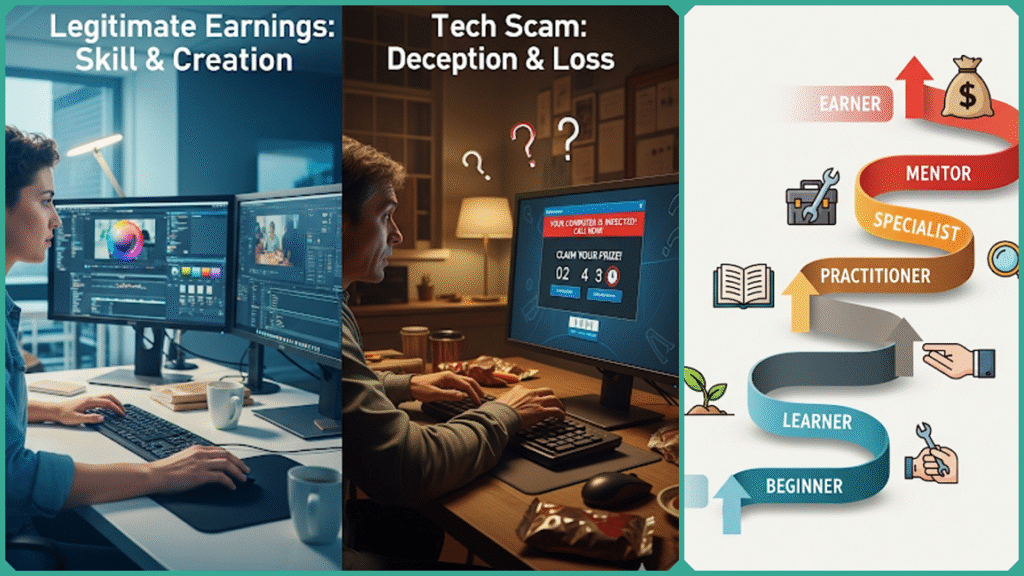Stop Tech Scams: Learn Top Skills to Earn Your First $1,000
Estimated reading time: 17 minutes
In an age where technology offers unprecedented opportunities for career growth and financial freedom, the threat of tech scams looms larger than ever. Each year, millions of hopeful individuals seeking to break into the tech industry fall victim to fraudulent schemes that promise quick riches but deliver only losses—financial, emotional, and in trust. If the fear of scams has ever held back your dream of earning money online or starting a tech career, this post is your trusted guide out of confusion and risk.
Stop Tech Scams: Master Essential Skills to Earn Your First $1,000 is tailored for aspiring tech professionals, career changers, students, and freelancers eager to build valuable, market-ready skills without falling for empty promises.

This guide not only teaches you how to spot and avoid tech scams but also empowers you to confidently develop high-demand skills such as web development, UX/UI design, digital marketing, cybersecurity, and tech writing. These fields provide real income opportunities and a clear path to earning your first $1,000 and more.
Why Do People Fall for Tech Scams?
It’s easy to judge someone for falling victim to a scam, but the reality is far more complex. Many people are drawn into tech scams not out of ignorance, but because scammers expertly exploit natural human desires and cognitive biases. The promise of quick money, escaping financial stress, or achieving a better life can be powerful motivators—especially when genuine opportunities seem overwhelming or out of reach.
Scammers use psychological tactics built on deeply rooted human tendencies: trust in authority figures, the fear of missing out, hope for a breakthrough, and even desperation in difficult times. They create a sense of urgency that pushes people to make impulsive decisions, while painting a picture that aligns perfectly with the victim’s hopes and needs. This emotional manipulation clouds judgment and decreases the likelihood of scrutiny.
If someone feels lost in a sea of information or frustrated by their inability to find legitimate ways to earn online, it’s no surprise they might be tempted by flashy promises or “get-rich-quick” schemes. Recognizing these psychological factors doesn’t excuse falling for scams, but it helps us understand why so many do—and why awareness and skill-building are the best defenses.
Understanding Technology Scams and Their Rapid Growth
Tech scams continue to grow in 2025, with phishing remaining one of the most prevalent and damaging methods used by cybercriminals. Statistics show that over 3.4 billion phishing emails are sent daily worldwide, accounting for about 1.2% of global email traffic. Phishing contributes to roughly 36% of all cybersecurity breaches, with 80% of reported cybercrimes attributed to phishing attacks.
These scams not only cause massive financial losses—$12.5 billion was lost to email scams in 2024 alone, marking a 25% increase from the previous year—but also lead to severe data breaches and loss of trust for businesses and individuals alike.
Human error plays a significant role, as about 60% of security breaches stem from phishing and other scams that exploit human vulnerabilities like trust, urgency, and cognitive overload. AI-driven phishing campaigns are becoming more sophisticated, crafting highly personalized messages that are difficult to detect with traditional security tools.
New and increasingly sophisticated scam tactics emerging in 2025 include a variety of deceptive strategies designed to exploit individuals and organizations more effectively than ever before:
- Advanced voice phishing, commonly referred to as vishing, involves scammers employing highly sophisticated and elaborate techniques to deceive and manipulate unsuspecting victims during phone calls. These fraudsters use various strategies to convincingly impersonate trusted individuals or organizations, making their scams more effective and difficult to detect.
- QR code phishing, also known as quishing, is rapidly becoming a more widespread and concerning issue. This deceptive tactic involves tricking unsuspecting users into scanning malicious QR codes that redirect them to fraudulent websites designed to steal personal information or install harmful software. As this method gains popularity among cybercriminals, it is increasingly important for users to remain vigilant and cautious when encountering QR codes in various settings.
- Another deeply concerning and alarming development in recent times is the rapidly increasing use of advanced deepfake technology for deceptive purposes. This technology allows the creation of highly realistic but entirely fake audio and video content, which is then used to impersonate individuals with astonishing accuracy.
Such sophisticated impersonations are frequently employed to carry out various scams and fraudulent activities, posing significant risks to personal security and trust. The pandemic and increased digital reliance have doubled the frequency of phishing attacks since 2020, with cybercriminals continuously evolving their strategies.
- For example, in 2025, WhatsApp meme scams became increasingly prevalent, spreading sophisticated malware through seemingly harmless and entertaining images. These deceptive memes were cleverly designed to trick users into clicking on them, which then allowed the malware to silently infiltrate their devices. Once installed, the malware gained unauthorized access to users’ sensitive personal information as well as their financial data, putting their privacy and security at significant risk.
Overall, millions of people globally—estimated at over 600 million annually—fall victim to scams, with significant financial and emotional costs. The prevalence of these scams underscores why red flags such as unrealistic income promises, upfront payment requests, unverifiable testimonials, and a lack of verified employer details should never be ignored.
While exercising caution is necessary, it is equally important to be able to distinguish between scams and legitimate opportunities that offer genuine skill-building and real income generation in the tech industry. Being vigilant helps protect against fraud, but recognizing authentic chances for growth and earning is crucial for career advancement.
Top Legitimate Tech Skills to Earn Your First $1,000
The most effective and reliable way to avoid falling victim to tech scams is to focus on building tangible, marketable skills that are highly sought after both globally and within your local job market. Developing these practical abilities not only protects you from scams but also opens up genuine career opportunities with significant earning potential.
Below, we highlight five essential tech skills that are firmly grounded in up-to-date market salary data and emerging industry trends. Along with detailed practical guidance, these skills offer clear insight into potential income levels, helping you make informed decisions about your professional development path.
| Tech Skill | Income Potential & Salaries (2025) | Getting Started & Tips |
|---|---|---|
| Web Development | Entry-level web developers earn from $50,000 to $90,000 annually in developed markets, with freelance projects paying between $300–$1,000 for small websites. | Learn HTML, CSS, JavaScript, React, and Django with freeCodeCamp or Udemy courses. Build portfolio sites and contribute to open-source projects. |
| UX/UI Design | Entry-level UX/UI designers make around $50,000 to $75,000/year with freelance gigs from $500 to several thousand dollars per project. | Use Figma, Adobe XD tutorials online. Improve existing apps/websites and build a sample portfolio. Freelance on platforms to gain experience. |
| Digital Marketing (SEO, Content, Social Media) | Freelancers can consistently earn $1,000+ monthly. Salaries for SEO specialists average around $50,000 annually. | Study SEO basics with Google Analytics, Moz. Target small local businesses or startups for client work. Build a strong portfolio of successful campaigns. |
| Cybersecurity and Ethical Hacking | Entry-level certifications like CompTIA Security+ increase earning potential. Bug bounty hunters can earn from hundreds to thousands, depending on bug severity. | Practice legally using labs, join HackerOne for bounties. Gain certifications. Build knowledge of networking and security protocols. |
| Freelance Tech Writing & Content Creation | Skilled writers charge $50-$100+ per article. Experienced writers can earn $1,000+ from several assignments. | Create tech-focused content samples. Pitch blogs and tech companies. Build expertise in explaining complex tech clearly and engagingly. |
Additional Insights
- In regions such as Nigeria, technology salaries can vary significantly but often prove to be quite lucrative, especially within rapidly expanding sectors. For instance, professionals like software developers, AI engineers, and cybersecurity specialists are experiencing increased demand due to the growth of fintech companies and cloud service providers. These organizations frequently offer highly competitive compensation packages to attract and retain top talent in these specialized fields.
- The ongoing global trend increasingly favors professionals with skills in AI and machine learning, reflecting a growing demand across various industries. These specialized skills command a significant salary premium, typically around 17% higher compared to peers who do not possess expertise in AI. This premium highlights the value organizations place on advanced technological capabilities in driving innovation and maintaining competitive advantage.
- Freelancing platforms and the rise of remote work have significantly democratized the opportunities for earning income, making it much easier for beginners to find and secure small projects. These platforms provide an accessible entry point for individuals to start building their professional portfolios, gain valuable experience, and steadily work towards achieving their initial financial milestones. Many newcomers are now able to earn their first $1,000 and continue to grow their income by leveraging these digital tools and remote job opportunities.
This detailed comparison helps aspiring tech professionals gain a comprehensive understanding of how current market demands directly influence potential income levels. It provides clear and actionable pathways that are completely free from scams, ensuring that individuals can confidently pursue genuine opportunities based on real-world data and trends. This approach empowers learners to make informed decisions about their career development in the technology sector.
Current Trends and Opportunities in Tech Careers
The technology industry is continuously evolving in a dynamic and fast-paced manner, with innovative technologies and changing business requirements consistently reshaping the landscape of career opportunities. As we look ahead to 2025, several emerging fields stand out as particularly promising, providing not only lucrative salaries but also substantial growth potential. ‘
These sectors are especially well-suited for beginners who are eager to earn their first $1,000 and establish strong, sustainable careers in the long term.
Artificial Intelligence (AI) and Machine Learning
The widespread adoption of artificial intelligence (AI) and machine learning technologies across various sectors—including healthcare, finance, retail, and manufacturing—is significantly driving the demand for professionals who possess strong programming skills in languages such as Python, as well as expertise in powerful tools like TensorFlow and PyTorch.
AI specialists generally earn approximately 17.7% higher salaries compared to their peers who do not have AI-related skills or experience. Additionally, job postings that specifically require expertise in generative AI have surged dramatically, having tripled over the past year alone, which clearly reflects the explosive growth and increasing importance of this field.
For instance, AI engineers working in Nigeria can expect competitive annual salaries that typically range from NGN 8 million to NGN 14 million, with similar upward salary trends being observed in many other countries around the world.
Cloud Computing
Cloud services such as AWS, Microsoft Azure, and Google Cloud have become the cornerstone of modern corporate IT strategies, playing a crucial role in how businesses operate and scale their technology infrastructure.
Cloud Solutions Architects are among the highest-paid professionals in this space, commanding impressive salaries that average around $157,978 annually in the United States, with top earners making as much as $200,000 or more. Despite these lucrative compensation packages, the industry continues to face a significant shortage of skilled cloud professionals.
This shortage creates a wealth of opportunities for newcomers who are willing to invest time in developing foundational skills in cloud administration and cloud development. Typically, these roles require a strong understanding of cloud infrastructure, networking principles, and security best practices, making expertise in these areas highly valuable and sought after by employers.
Cybersecurity
The significant increase in cyber threats over recent years has greatly escalated the demand for robust and effective cybersecurity defenses. Information Security Analysts play a critical role in protecting organizations from these threats and typically earn an average annual salary of around $107,427.
Those with extensive experience and advanced skills can command salaries as high as $161,878 per year. Earning certifications such as CompTIA Security+ not only elevates a professional’s credibility but also significantly enhances their employability in the competitive cybersecurity job market.
Additionally, engaging in ethical hacking and participating in bug bounty programs offer flexible and rewarding opportunities to build both income and reputation by legally discovering and reporting software vulnerabilities.
Remote Work and Freelancing
Remote work has rapidly become a mainstream mode of employment, largely facilitated by the rise of digital freelance marketplaces such as Upwork and Fiverr. This significant shift has helped democratize access to technology-related income opportunities, making it possible for individuals from diverse backgrounds and locations to participate. Beginners, in particular, can now engage in manageable projects from anywhere in the world, breaking down previous barriers to entry.
These newcomers have the chance to start earning money by taking on small client jobs in various fields, including web development, digital marketing, UX/UI design, and content creation. As they complete these projects, they simultaneously build and strengthen their professional portfolios, gaining valuable experience and credibility for future opportunities.
Other Growing Areas
Emerging and rapidly evolving fields such as blockchain development, the Internet of Things (IoT), and virtual and augmented reality (VR/AR) are increasingly offering exciting new career pathways that come with highly competitive salary packages.
Blockchain engineers, in particular, earn an impressive average annual salary of approximately $127,025, a figure that reflects the increasing and rapidly growing demand for secure, transparent, and reliable digital transactions across a wide range of industries and sectors.
This high level of compensation is driven by the critical need for experts who can develop and maintain blockchain technology, which has become essential for ensuring trust and security in digital operations worldwide.
Meanwhile, professionals specializing in IoT and VR engineering can expect to earn salaries ranging from $70,000 up to $124,000, depending on their specific area of expertise and level of specialization within these innovative technological domains.
Salary and Role Insights
- Cloud Architects typically earn an annual salary of approximately $201,572, reflecting their high level of expertise and critical role in designing and managing cloud computing systems. This compensation highlights the significant demand for their specialized skills in the evolving technology landscape.
- Data Scientists typically earn an average annual salary of approximately $128,429, reflecting their specialized skills and expertise in analyzing complex data sets. This figure represents the median income for professionals in this field, highlighting the high demand and value placed on data science roles across various industries.
- Blockchain Engineers earn an average annual salary of approximately $127,025, reflecting the high demand and specialized skills required in this rapidly evolving field. This figure represents the typical yearly income professionals can expect, highlighting the lucrative opportunities available for those with expertise in blockchain technology and development.
- Information Security Analysts earn approximately $107,427 annually on average, reflecting their crucial role in protecting organizational data and systems. This salary figure highlights the value and demand for skilled professionals in the field of information security, emphasizing the importance of their expertise in safeguarding digital assets against cyber threats.
- Software Developers typically earn an average annual salary of approximately $120,204, reflecting their specialized skills and the significant demand for their expertise in the technology industry. This figure represents the median income and can vary based on factors such as experience, location, and specific technical proficiencies.
- Help Desk Technicians: Approximately $58,549 annually (While these roles are essential and play a crucial part in supporting IT operations, they tend to experience slower salary growth over time, primarily due to the lower level of specialization required compared to more advanced technical positions)
As the tech landscape evolves, skills at the intersection of data, security, cloud, and AI are driving the highest gains. Entry-level roles see moderate salary growth, but mid-level positions show robust pay increases, signaling investment in retaining talented professionals.
For beginners who are focused on earning their very first $1,000, the key to success lies in strategically aligning their skill acquisition with these high-demand areas. At the same time, it is crucial to leverage remote and freelance opportunities effectively in order to gain valuable practical experience gradually over time. This approach not only builds confidence but also enhances expertise in a way that supports sustainable income growth.
This strategy not only helps you effectively avoid falling victim to tech scams but also enables you to carve out a clear, financially rewarding career path in the rapidly evolving and constantly shifting tech industry landscape of 2025 and beyond. By following this approach, you position yourself for long-term success in an ever-changing market.
FAQs
How can I tell if a tech job offer or course is a scam?
Be vigilant and verify every opportunity before committing. Key warning signs of scams include unrealistic promises of high pay with little effort, requests for upfront payments for training or tools, vague job descriptions without clear responsibilities, and unsolicited offers from unknown companies. Legitimate employers use professional email domains, conduct proper interviews, and don’t ask for sensitive personal or financial information early on.
Verify the company’s identity by checking official websites, looking for online reviews, and asking for references. Avoid jobs or courses that pressure you to act quickly without time to research. Legitimate tech courses rarely require large upfront fees without clear accreditation or trial options.
Do I need a degree to start earning in tech?
Many employers and clients today prioritize skills, certifications, and a demonstrable portfolio over formal degrees—especially in fields like web development, digital marketing, and UX/UI design. Freelancing platforms value proof of work through samples and client feedback more than academic credentials. However, investing in recognized courses or certifications can boost credibility and speed your career growth.
How long does it take to earn the first $1,000?
This varies based on the skill you choose and your dedication, but it’s possible to earn your first $1,000 within 1 to 3 months by consistently applying your skills through freelance projects, internships, or part-time roles. For example, beginner web developers or digital marketers who leverage local business clients or online marketplaces often reach this milestone fairly quickly with persistent effort.
Are free online courses effective for learning these skills?
Many high-quality free resources exist and can effectively teach foundational skills. Platforms like freeCodeCamp, Coursera (free audit mode), and YouTube offer comprehensive learning paths. However, paid courses sometimes provide better structure, mentorship, certification, and networking opportunities, which can accelerate learning and improve job prospects. Choose courses carefully and research reviews to avoid overpriced or low-value options.
What’s the best way to gain experience quickly?
Hands-on experience is critical. Build real projects for yourself or nonprofits to showcase in your portfolio. Participate in internships or volunteer for local businesses needing tech help. Contributing to open-source projects can also provide valuable exposure and connections. Freelance platforms enable you to start with small gigs and progressively take on bigger challenges, helping build both skills and income.
In Conclusion
Avoiding tech scams is absolutely essential in today’s digital economy, but fear should never hold aspiring professionals back from pursuing rewarding careers in tech. The best way to protect yourself is by focusing on acquiring legitimate, high-demand skills such as web development, UX/UI design, digital marketing, cybersecurity, and tech writing. These skills are your ticket to confidently earning your first $1,000 and building a foundation for sustainable income and career growth.
This journey requires patience, continuous learning, and hands-on practice, but the rewards far outweigh any quick-fix schemes or high-risk shortcuts. Developing a strong portfolio, staying updated with market trends, and seeking real-world experience enable you to create lasting value for clients and employers while shielding yourself from scams.
Remember, success in tech is not about instant wealth—it’s about steady progress, credibility, and building trust with yourself and others. Start small, stay consistent, and keep refining your skills. This approach not only keeps you safe from scams but also positions you for long-term success and fulfillment in the thriving tech ecosystem.
Discover more from Skill to Grow
Subscribe to get the latest posts sent to your email.






